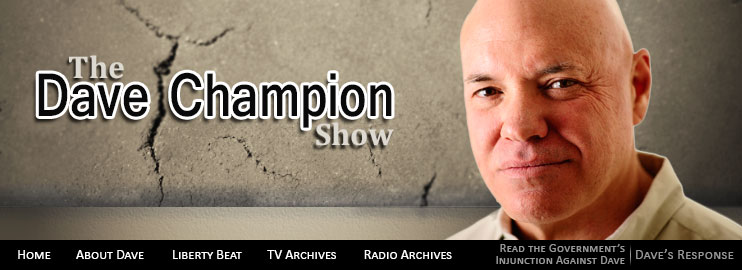Iranian ayatollahs issue fatwa and order the deaths of those who burn the Quran.
DAVE EXPLAINS WHY ISLAM AND PERSONAL LIBERTY ARE 100% INCOMPATIBLE.
Dave announces a new “special editions” aspect of his show!
Hear the proposed constitutional amendment to restore privacy in America.
Hear the proposed constitutional amendment to restore accountability in our servants in government.

Proposed Oath of Office Restoration Amendment
Whereas good governance demands public officers be held accountable to the People for their actions,
Whereas the purpose of the oath of office is to create a legally binding obligation to the People of a state or the United States,
Whereas inalienable rights and civil rights constitute a prohibition against government action,
All officers of a state of the Union and the United States shall be personally liable to the citizens of the states of the Union for any violation of the Citizen’s inalienable rights and shall be liable to the citizens of the United States for any violation of the citizen’s civil rights.
A citizen alleging a violation of his rights may bring a common law suit against the officer of a state of the Union or an officer of the United States before a state court in the state in which the violation occurred. Trial shall be decided by a jury of the plaintiff’s peers. No statutory enactment is necessary to establish such suit. This Amendment is self executing. The United States is without jurisdiction in all such suits.
The defendant shall not be allowed the assistance of counsel or other
legal assistance to a degree greater than the plaintiff enjoys. Immediately upon notice of suit both parties shall file a detailed declaration with the court declaring the full scope of their legal assistance. The court shall restrict the defendant to the like resources of the plaintiff as stated upon the plaintiff’s declaration. Intentional misrepresentation on the declaration filed with the court shall be punishable by two years in prison.
Awards against a government officer shall be paid by the officer, not the government, nor shall the officer’s salary or other remuneration be increased to compensate the officer for the payment of damages from the suit.
A claim by the officer that he was ordered to commit the act shall not be a defense to a suit under this Amendment.
Judicial officers are not exempt in any way or any degree from this Amendment. The judicial branch is without authority to rule on the constitutionality of this Amendment.
Awesome proposed constitutional amendments, you won’t get that on the Rush Limbaugh Show.
Proposed Privacy Amendment
Whereas technology and other developments have eroded the traditional privacy protections of the Citizens of the states of the Union as well as citizens of the United States, the following restrictions are hereby placed on the actions of federal and state governments.
A warrant shall be required at every instance to access or acquire any information about a Citizen of a state of the Union or a citizen of the United States unless said information has been placed in the public domain by that citizen. A warrant is required to access [or acquire] a citizen’s information even if it is in the custody of a third party. The use of electronic or other devices including, but not limited to, unmanned aerial vehicles, helicopters, satellites, thermal imaging, GPS, and night vision to track or monitor a citizen shall require a warrant unless in pursuance of a post conviction parole requirement or as a condition of bail. This prohibition does not apply in cases in which law enforcement is in hot pursuit of a person where probable cause exists to believe that person has committed a felony.
No record of physical attributes or biometrics [, which includes but is not limited to fingerprints, face recognition, DNA, palm print, hand geometry, iris recognition, retina scan, bacteria counts and odor or scent] may be taken unless upon conviction of a felony. Fingerprints may be taken only upon conviction of a misdemeanor or felony. [The above restriction does not prevent the governments from storing or using the biometrics of government employees who are citizens for use as an authentication factor to access computers, networks, secure areas or other similar applications. Upon termination of government employment all such employee biometrics shall be expunged. ]
Biometric samples may be taken from the deceased if the death is directly attributable to a violent crime. Crime victims may volunteer their physical biometrics or other physical media, including that media presumptively belonging to a perpetrator, to the police for purpose of a criminal investigation. Police shall maintain said biometric or other physical media only until such time as the case is closed or the victim rescinds consent.
All warrants obtained under this Amendment shall be served with the sworn statement of probable cause submitted to the court by the officer seeking the warrant. If the warrant and the statement of probable cause are not presented to the citizen who is the target of the search warrant prior to the search being conducted no evidence from the search shall be admitted into evidence in any proceeding and the officer or officers who conducted the search may be sued in their personal capacity in the court of the state in which the violation occurred for a violation of the Citizen’s inalienable rights in the case of a state Citizen or civil rights in the case of a citizen of the United States.
This Amendment makes federal officer and state officers both liable to the judgment of state courts for litigation brought under this provision.
The governments are without authority to use any device that intrudes into the consciousness or subconscious of a citizen or alters or captures any information directly or indirectly from the citizen’s brain.
The judicial branch is without authority to create judicial exceptions of any kind to this Amendment under any rationale or pretense.